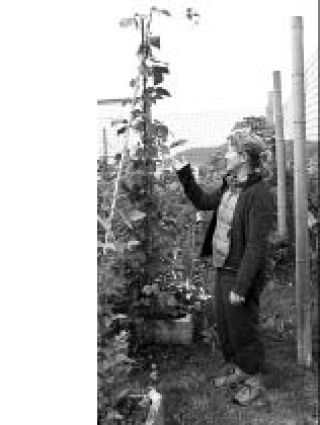Lorri Swanson admires the Scarlet Emperor runner beans which students will study this year in class.
If you visited the Lopez School garden on last June’s Lopez Garden Club tour, you know what a productive and pretty food garden it is. During the past four years, through the work of students, teachers, volunteers and donors, the school garden has grown beyond the Rishi Memorial Garden to include a teaching garden, a fenced orchard with vegetable beds and three hoop houses. The garden, which is formally called the Lopez Island Farm Education Garden (L.I.F.E.), has been in existence for five years. I toured it again on a late summer morning to find out what’s growing as the school year begins.
Lorri Swanson, Lopez School K-5 Garden Teacher for the past three years, led me through the garden, pointing out vegetables that have matured over the summer and those that have just been planted, all of them destined for the school kitchen. She also described the learning that goes on in the garden and the classrooms.
We began our tour admiring heads of green and purple cabbage, bushes of beans, and a stand of kohlrabi, all ready just in time for the start of school.
“We planted them really late to have them now,” Lorri explained. Part of her summer responsibilities as garden teacher is maintaining the garden the students planted in the spring. Pointing to a bed now planted with cabbage, cauliflower and broccoli that will mature later in the fall, she said, “We got 200 lbs of potatoes from that bed.” Another storage crop—Hubbard squash—rose from sprawling vines along the garden fence.
Our next stop was the three hoop houses. In one, rows of lettuce at various stages of maturity stretched the length of the hoop house; in another, rows of hardier greens were just starting to grow.
“Our goal is to supply salads to the kitchen throughout the year,” she explained. And in the third hoop house: tomatoes, lots of them!
“I asked school chefs Dana and Sam what they’d like to see in the hot house and they said ‘bring on the tomatoes,’” Lorri said, adding, “the primary school raised all the starts and the middle school helped to plant them.” The tomatoes will end up on the salad bar and in sauces.
While one goal of the garden is to provide fresh produce for the school kitchen, another is to provide learning opportunities for students. Pointing to lettuce and kale plants that had gone to seed, Lorri said, “They went through a full summer cycle. They could have been replanted but it’s important for the kids to come back and see what happened.” Looking at two rows of scarlet runner beans, she noted several plants that weren’t thriving and said that students would study the soil to figure out what was wrong.
We sat down at the edge of the garden and Lorri told me more about how the garden is integrated into the curriculum.
“Once a week, I meet with each K-5 grade level and we learn a lesson, geared for each level. The topic for September is propagation.”
And once a week, each homeroom has a hands-on class in the garden or, if the weather is bad, in the classroom. Before going to the garden, students know what tasks need to be done—planting seeds or transplants, weeding, making compost—and will divide up based on what they want to do.
“It’s nice to let them come out and do what resonates with them. Then when we get back together we talk about what we found.
“We’ll also be featuring a vegetable each month. September will be the tomato. We’ll learn all about it and its benefits.”
The students will also cook, making a tomato dish in class that will then be featured on the lunch menu. And there will be a recipe kids can take home and prepare for their family.
The garden also is a learning resource for the health and wellness curriculum, providing opportunities to make connections between vegetables and nutrition as well as between the garden and emotional wellbeing. Summing up the role of the garden in the curriculum, “You can learn forever in the garden,” Lorri said.
Visit the L.I.F.E. Garden at Lopez School, and read more on the school’s new website at www.lopezislandschool.org/programs/garden. You may learn something there, too.



